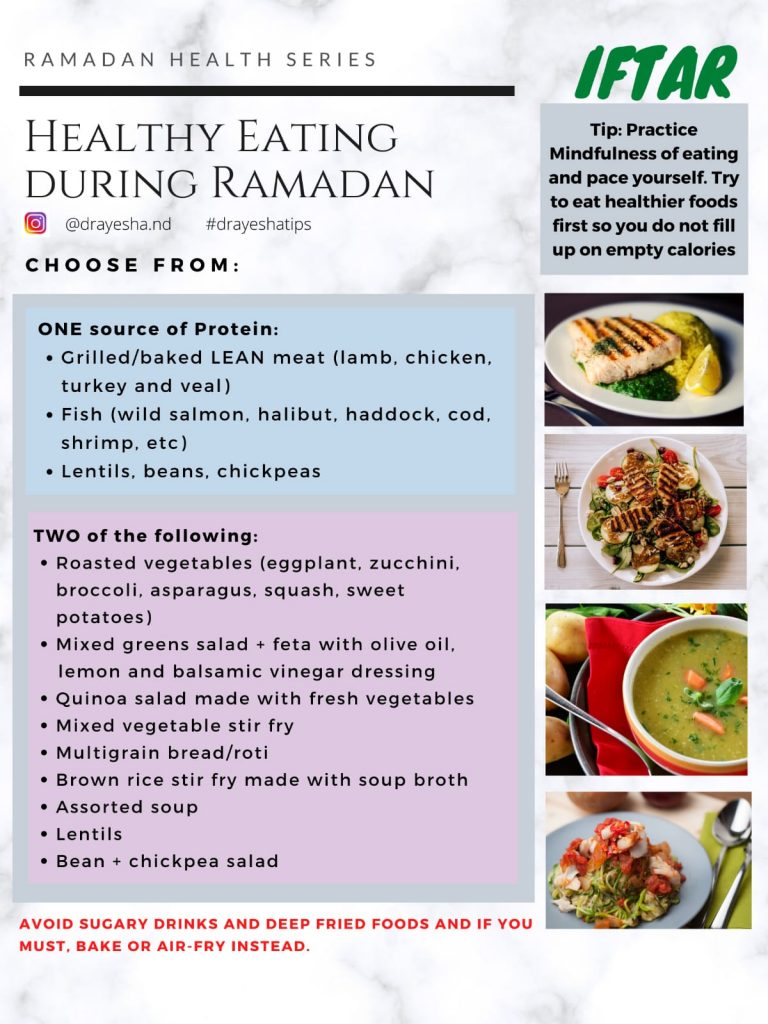
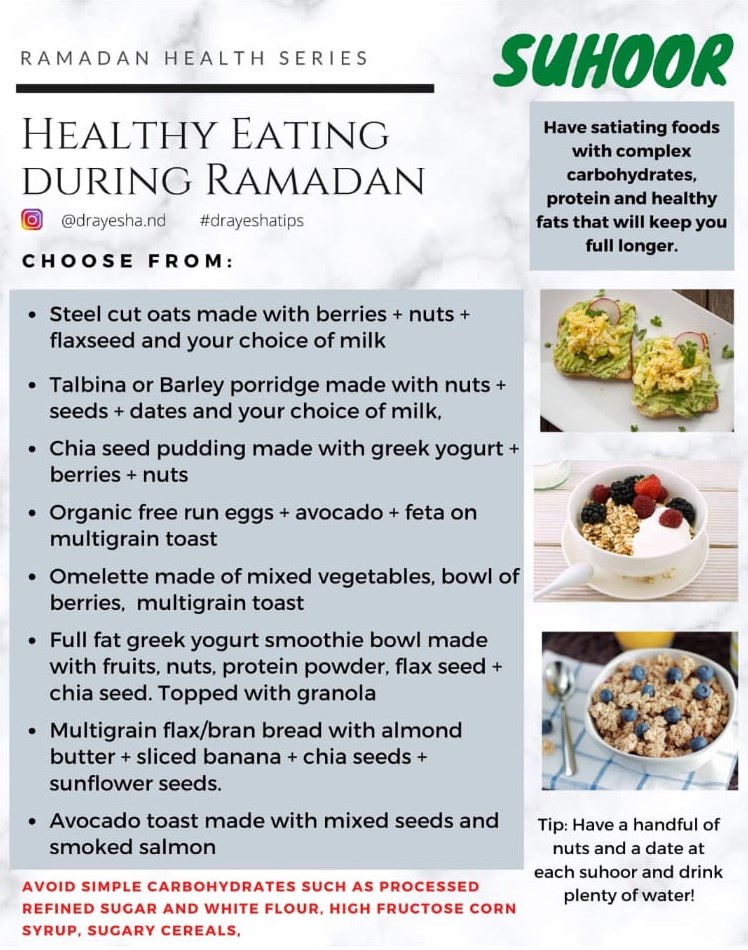
R a m a d a n H e a l t h T i p : Hydration
How many of you have been asked by coworkers and friends if you can have water while fasting? “Nope, not even water!” may surprise many who are unfamiliar with fasting in Ramadan. With an almost a 17 hour fast, proper hydration is very important to prevent dehydration.
Here are a few tips on staying well hydrated during Ramadan:
– Aim to drink 2 cups of water at suhoor followed by 4-6 cups of water from post-iftar to suhoor time. The best way to make sure you are drinking enough water is to keep a water bottle and sip throughout the night.
-Try to avoid sugary drinks such as juices and pop as they will spike your blood sugar without providing nutritional value.
-Drink coconut water daily. Coconut water is not only hydrating but has electrolytes too and can replete nutrient losses.
-Limit overly salty and caffeine during Suhoor as it can cause water to flush out resulting in increased thirst throughout the day.
-Consume hydrating fruits and v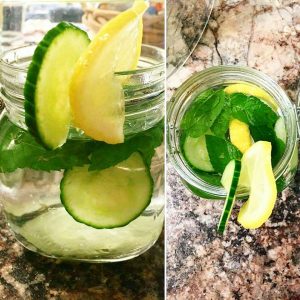 egetables such as watermelon, cantaloupe, pineapple, cucumber, celery and orange as they are rich in water and provide vitamins and minerals. However eating these fruits does not replace the need of water consumption. .
egetables such as watermelon, cantaloupe, pineapple, cucumber, celery and orange as they are rich in water and provide vitamins and minerals. However eating these fruits does not replace the need of water consumption. .
– Replenish your thirst with fruit infused waters
Here are a few of my favourite fruit-infused water beverages:
Berry infused water: Strawberries, blueberries, raspberries + water + ice.
Citrus cucumber water: Lemon and orange slices, cucumber + water + ice. Optional: A pinch of himalayan salt
Mint Refresher: Peppermint leaves, cucumber, lemon + water + ice.
Watermelon mint refresher: Watermelon slices, peppermint leaf + water + ice.
These waters are not only flavourful, but nutritious too.
Be sure to eat all the left over fruit too for the added nutrients. Stay hydrated!
If you are, then the thought of giving up caffeine and fasting long hours without an energy stimulant may seem daunting! Don’t wait till Ramadan to reduce your caffeine intake. Start a few weeks earlier and try to cut your caffeine intake sooner.
Here are some tips that can help you.
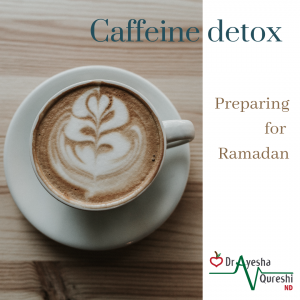 -If you are currently drinking more than 2-3 cups daily, start by cutting down each cup weekly. If you are at 3 cups then reduce to 2 cups for one week then to 1 cup the following week. This will allow your body to get accustomed to reduced caffeine. Most find weaning off coffee to be easier than reducing it cold-turkey.
-If you are currently drinking more than 2-3 cups daily, start by cutting down each cup weekly. If you are at 3 cups then reduce to 2 cups for one week then to 1 cup the following week. This will allow your body to get accustomed to reduced caffeine. Most find weaning off coffee to be easier than reducing it cold-turkey.
– During the weaning process, you can also switch from high caffeine beverages to ones that have a lesser amount. For example if you are an espresso drinker (2 oz Starbucks Espresso contains 150 mg of caffeine) you can switch to a tea (8 oz black tea contains 47mg and green tea contains 35 mg of caffeine). This will help in “adjusting” your body’s dependency on caffeine. It may also cause milder effects of caffeine to withdrawal later on.
– Be sure to eat high energy foods during suhoor and iftaar to get the same energy stimulating effects can can provide. Stay tuned for an upcoming post!
– If you must have caffeine in Ramadan, I would recommend to consume it when you open your fast (an hour after iftaar). Caffeine has dehydrating effects on the body and can increase your thirst during the day if you consume a lot of caffeine during suhoor.
Hopefully these tips can help you wean off caffeine in the coming weeks in preparation for Ramadan! Reducing your caffeine intake or going caffeine-free completely can be a great form of detox! While caffeine can provide various health benefits, A caffeine-free cleanse can be very helpful to overall health:
-caffeine-free diet can reduce anxiety and anxiety related symptoms.
-caffeine can reduce the absorption of some nutrients such as calcium and iron. A caffeine free lifestyle can result in better absorption of nutrients.
-caffeine has stimulating effects on body that can last for hours. For those wanting better sleep, a simple caffeine-detox may be the perfect thing your body needs to help you fall asleep better.
-caffeine beverages such as coffee and black tea can stain enamel on your teeth so removing them from your daily diet can help with whitening your smile.
-A caffeine detox may boost healthier looking skin. Caffeine can interfere with collagen formation. Collagen is a structural protein that holds tissue together and is important for cartilage formation, joint health and for healthy vibrant skin and nails.
– if you have a sensitive stomach, some caffeine beverages can affect your gut and contribute to reflux.
Ramadan is about 4 weeks away- start now on reducing your caffeine intake. Reducing your caffeine dependency can help reduce withdrawal effects such as headache and fatigue.
Wishing you an upcoming blessed month 🙂
Preparing for the Flu Season- A Naturopathic Approach.
The flu has been in full swing this winter, affecting thousands of people across Canada and the US. The Center for Disease Control (CDC) has called this year’s flu an epidemic due to its widespread occurrence. Influenza, the virus that causes the flu, can exist in multiple strains and is “predictably unpredictable” each flu season. This year there are three major strains; H1N1, H3N2 and a B strain. The majority of flu cases in Canada are of the H3N2 strain, a strain that is prone to mutation. This is particularly problematic because this year’s vaccine is not an exact match for the H3N2 and B strains, resulting in higher flu incidences and risk of complications. The flu can be very debilitating, causing symptoms of high fever, body aches, fatigue, headache, runny nose, congestion, cough and more. The virus spreads through respiratory droplets in the air and can be passed around from person to person.
 A dangerous strain in addition to a less effective vaccine has resulted in a more serious and rough flu season! As a Naturopathic Doctor, I am often asked what can I do to prevent the flu naturally during flu season.
A dangerous strain in addition to a less effective vaccine has resulted in a more serious and rough flu season! As a Naturopathic Doctor, I am often asked what can I do to prevent the flu naturally during flu season.
Here are my recommendations:
Many naturopathic treatments can be beneficial in strengthening the immune system. Talk to your Naturopathic Doctor and find out what you can do to keep you and your family healthy amid cold and flu season.
September is here and your kids are back in school. Whether you are a first time school parent or September marks a recurring school routine for your kids, its best to start the school year right and healthy. Here are some tips for parents in making the school year full of health and wellness:
1. Dress fit for the weather: With change of seasons and summer temperatures cooling down, make sure to dress kids warm. It is very common for many children to get sick in the fall and one of the reasons is due to the onset of cooler temperatures that cause some viruses to flourish. Helpful tip: Be prepared and pack an extra sweater, socks and scarf at your child’s school and keep warm.
2. Get your child a good backpack: wide, padded and doubled shoulder bags are the way to go! Avoid single shoulder bags that may strain your child’s shoulder. Carrying a heavy bag incorrectly can cause your child to develop poor posture and have muscle strains. It is recommended that backpacks not be hung too low, no more than 3-4 inches below the waistline to balance out the weight of
the bag.
3.Establish healthy dietary habits:
~Wholesome lunch ideas: Wholegrain sandwiches made with lettuce, tomatoes and choice of organic meat (chicken, turkey, salmon, tuna, eggs etc), bean vegetable chilly, variety of soups, avocado turkey wrap, quinoa and wholegrain pasta.
~Healthy snacks: Reduce the sugar load! High sugar consumption in children and adolescence can be associated with increased dental cavities, hyperactivity, weakened immunity and chronic colds, and increased risk of obesity and diabetes later on in life. “The American Heart Association has issued its recommendations on added sugar, urging parents to make sure children between two and 18 are eating fewer than six teaspoons per day.” Healthy snack ideas: mixed fruit and vegetables, hummus with carrot, cucumbers, celery sticks, wholegrain granola bars, popcorn and wholegrain crackers + cheese. Limit consumption of chocolate bars, candy and chips – healthy eating habits start young! Be sure to check with your child’s school and make sure there aren’t any classmate allergies before packing their lunches!
4. Make sure your child is staying hydrated: Many children during school hours consume very little water and consume more sugary juices and pop instead. Did you know that on average, your human body is about 60% water. Water is essential for cellular function, makes up many body fluids, regulates body temperature, provides moisture to mucosal membranes, flushes body waste, lubricates joints and is the most abundant component of articular cartilage. Lack of water can also contribute to constipation in many children among other factors. The amount of water your child needs depends on their age and weight. Set a goal with your child and follow up daily on their water consumption.
5.Does your child need supplementation?
~Vitamin D: According to Stats Canada (2015), about 32% of Canadians had vitamin D inadequacy with 40% having vitamin D inadequacy in the winter months. Low vitamin D levels have been linked with poor bone mineralization and skeletal deformities, muscle pain, asthma, low immunity, risk of cardiovascular disease among more. Sources of vitamin D include egg yolk, fish (salmon, sardines, tuna etc), mushrooms and fortified dairy products. Limited sun exposure and having darker pigmented skin can put you at risk of vitamin D deficiency. Talk to your Naturopathic Doctor or healthcare provider to see if you are getting an adequate amount of vitamin D and if supplementation may be necessary.
~Probiotics and immune support: The gut has a strong influence on your immune system. Keeping your gut healthy is an essential step in keeping your whole body healthy! Incorporating probiotics in the diet is one recommendation I often tell my patients to help improve their gut. Probiotics are live bacterial organisms that are beneficial to your overall health. There are many factors that can affect the gut such as poor dietary habits, stress and medications. Antibiotics for example not only kill the bad bacteria but they also destroy the good bacteria in the gut. Probiotics will help restore the microbiota balance. Probiotic foods include pickles, yogurt, kefir, sauerkraut and tempeh. Probiotic supplementation may also be helpful in many cases such as constipation. Talk to your healthcare provider or Naturopathic Doctor and see which strain and dosage is right for your child!
~Botanical herbs: There are a number of botanical herbs that are immune stimulating and strengthening. These include Astragalus, Codonopsis and Echinacea. These herbs are often used more preventatively than during an active infection. Be sure to discuss with your health practitioner if these herbs are right for your child. These herbs would not replace the need for antibiotics, if needed.
6.Ensure your child is getting good quality of sleep. It is generally recommended that children and adolescents should get 8-10 hours of sleep daily. Setting a bedtime and establishing a bedtime routine can be helpful in getting quality of sleep.
7.Manage stress and anxiety: No matter what the age is, school can be stressful and anxiety provoking for many. Stress can lead to many health ailments and impact the immune system. Good communication with your child can help create an open discussion. Mindfulness and breathing exercises can also help. Extracurricular activities are important but keep in mind not to over schedule your child!
Have a healthy school year 🙂
The holy month of Ramadan is around the corner. Muslims will be fasting from dawn to dusk for 30 days. Fasting during the month of Ramadan provides spiritual discipline and personal development to millions of Muslims each year.
As summer is approaching and fasts are getting longer, the importance of eating high quality nutritious foods is necessary to obtain the full benefits during the holiest month in the Islamic calendar. Suhoor is the morning meal eaten before sunrise and iftaar is the meal upon breaking the fast at sunset.
If you come from a South Asian family (like I do), then you may be accustomed to eating a carbohydrate-rich suhoor consisting of rotis, parathas and breads, and iftaars made up of deep fried foods like samosas, spring rolls and pakoras followed by Rooh Afza (a sugary artificial flavoured drink). These foods seem satisfying and ‘hit the spot’ after a long day of food deprivation but high carbohydrate fried foods are not nutrient dense and make us feel full quicker! This can be problematic in Ramadan because food intake is below normal and there is a limited time to consume food.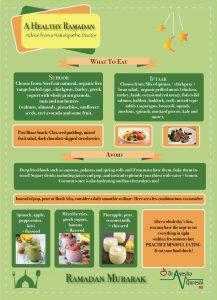
As a Naturopathic Doctor, I am often asked what are the most nutritious, high energy yielding foods to consume during suhoor and iftaar? Here are my general recommendations:
Suhoor: Protein-rich, complex carbohydrates and good quality of fats should be the goal for Suhoor. Complex carbohydrates are recommended to help release energy slowly during a long day’s fast. Complex carbs include barley, oats, wholemeal flour, beans and lentils. Fibre rich foods are also beneficial as they are satiating, normalize bowel movements and lower cholesterol levels and help control blood sugar levels. Protein rich foods will help curb blood sugar levels and carbohydrate cravings while having positive effects on metabolic and cardiovascular health. Avoid simple carbohydrates as they provide instant source of energy but are digested faster. Simple carbohydrates include foods containing processed refined sugar and white flower, high fructose corn syrup often found in soda pop, cereals, cookies, etc.
Iftaar: Have a balanced meal but consider high protein and low carbs, especially if you are looking not to gain the extra pounds that many ironically experience during ramadan. Avoid fried foods and high sugar foods that contain empty calories and will fill you up without meeting your nutritious needs.
Avoid fried foods such as samosas and pakoras, and if you must have them, bake them instead! Deep-fried foods often contain trans fat and are rich in empty calories which can cause fatigue and sluggishness throughout the day. Aim to bake or grill your foods instead!
6) Hydrate! During eating hours be sure to drink your daily water consumption of 8 glasses. Keep water bottles during evening prayers. Avoid sugary drinks including juices and pop, and instead replenish your thirst with water + lemon. Coconut water is also hydrating and has electrolytes too!
7) Do you experience increased thirst during the day? Limit overly salty foods and caffeine during suhoor as they cause water to flush out resulting in increased thirst.
8) After a whole day’s fast, you may have the urge to eat everything in sight within a few minutes but practice mindful eating and eat your food slowly. Take smaller portion sizes will allow time for your stomach to signal your brain that its been eating. This is essentially useful to prevent over-eating!
Hope you found these tips helpful. Ramadan Mubarak!! 🙂
More and more cases of influenza are emerging across the country and infectious-disease experts are warning the worst is yet to come. The past year the flu vaccine had low effectiveness rates and although this year’s vaccine may be a closer match it still won’t offer full immunity against influenza. “Experts believe the flu shot is a much closer genetic match to the H3N2 strain in circulation, which should bring up protection rates. However, Dr. Skowronski (an epidemiology lead for influenza and emerging respiratory pathogens at the B.C. Centre for Disease Control) cautioned that it still won’t offer full immunity against influenza. Flu viruses are constantly mutating and changing, so even though a vaccine protects against the H3N2 strain, that doesn’t mean it will be very effective against the virus in circulation, she said.”
As a Naturopathic Doctor, I am often asked what are some ways that can help prevent the flu:

Source: The Globe and Mail
I also utilize hydrotherapy, physical medicine and lifestyle counselling in my practice. Together with other modalities a comprehensive treatment plan is formulated to achieve wellness goals and improve health!